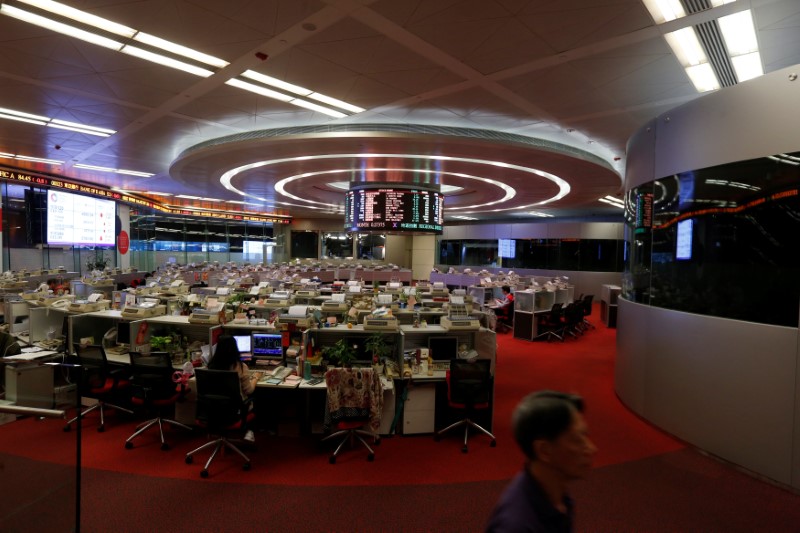By Samuel Shen and John Ruwitch
SHANGHAI (Reuters) - Chasing higher returns in a slowing economy, Chinese investors could soon dominate Hong Kong's stock market, likely redefining how shares, especially small-caps, are traded and priced there.
Chinese money will account for a third of Hong Kong's stock trading turnover in three years, up from a tenth now, UBS and other brokers predict. Some traders say it could hit 50 percent within five years.
That would be a sea change for Hong Kong's century-old stock market and a serious challenge to western players. European and U.S. investors now account for almost a quarter of stock turnover.
Fund managers say the inflow of Chinese money will be driven by deregulation, fears of yuan depreciation, and yield chasing as there are still wide valuation gaps between the two markets.
The shift could trigger a culture clash between fundamentals-dependent western investors and momentum-driven Chinese, who tend to be more aggressive and speculative.
It is likely to be most evident in Hong Kong's small-caps, as the opening of the Shenzhen-Hong Kong stock trading link, as early as November, will allow mainland Chinese to buy Hong Kong small- and mid-caps, bringing much-needed liquidity, but also likely speculative fever to growth stocks.
"Small-caps in Hong Kong have long suffered from poor liquidity ... and low valuations. Mainland investors have a penchant for growth stocks, often giving them stretched valuations," said Lu Wenjie, strategist at UBS.
"Mainlanders also like stir-frying concept stocks. A growth story with a 5-year horizon is often priced in just a week in China. Such an investment style will have a big impact on Hong Kong stocks."
MIND THE GAP
In blue-chip stocks, the price gap has already narrowed, with China-listed shares around a fifth more expensive than Hong Kong (HSCAHPI), as Chinese investors have bought stocks like HSBC (HK:0005), Tencent (HK:0700) and ICBC (HK:1398) via the already open Shanghai-Hong Kong Stock Connect scheme.
The Shenzhen-Hong Kong link will offer a broader investment scope.
"The valuation differentials between Shenzhen and Hong Kong small-caps are pretty significant," said Kinger Lau, chief China equity strategist at Goldman Sachs (NYSE:GS).
China's small-cap companies trade at over 40 times expected earnings, the highest in Asia-Pacific, and four times the ratio in Hong Kong.
The arrival of Chinese investors, who on average trade eight times more frequently than their Hong Kong peers, will likely increase market turnover, volatility and, potentially, the number of insider trading cases.
"Investors are very clever. They will bring to Hong Kong some of the Chinese style, but will also learn about the new environment [such as short-selling and additional share issuance] and adapt," said Fu Xuejun, strategist at Huarong Securities. "I don't think they'll be as crazy as they are in China."
Bourse operator Hong Kong Exchanges and Clearing Ltd (HK:0388) said it does not have details of fund flows from the mainland, and does not speculate on future market activity.
FUNDS FRONT-RUNNING
Anticipating a re-valuation of Hong Kong stocks once the Shenzhen link opens, some Chinese fund managers are already building up stakes in select stocks to front-run mainland money.
Shen Weizheng, Shanghai-based fund manager at Ivy Capital, said he has bought shares in Hong Kong-listed Yangtze Optical Fiber and Cable (HK:6869). "Water flows from high places to low places, naturally. Once the floodgate opens ... liquidity will flow south ... narrowing the valuation gaps," said Shen, who manages a $1 billion offshore fund that has 70 percent of its portfolio in Hong Kong stocks.
He noted Yangtze Optical Fiber trades at around 10 times earnings, while its China-listed rival Hengtong Optic-Electric Co <600487.SS> trades at three times that. "It's natural to buy cheaper assets," he said, noting the stock has jumped by more than a third since Beijing approved the Shenzhen link last month. Shen said the stock could gain another 50 percent as optic-fibre is a popular concept among mainland investors.
Shanghai-based hedge fund RPower Capital has also increased its bets on Hong Kong stocks, said Robert Di, founding partner. "Chinese regulators have stepped up a crackdown on speculation, so many domestic hedge funds are starting to play in Hong Kong," said Di, whose portfolio includes both blue-chips and small-caps, such as Genscript Biotech Corp (HK:1548).
PRICING POWER
The expected wall of Chinese money heading for Hong Kong, fueled by a need to diversify asset allocation and hedge against any yuan depreciation, will also seize more pricing power from global investors.
"The shift in pricing power will likely occur first in small-caps, and then spread to big-caps," said RPower Capital's Di. "A single spark can start a prairie fire," he said, referencing a civil war slogan of Mao Zedong. "It's the strategy of encircling the cities from the rural areas."
Hong Hao, chief strategist at BOCOM International, said more Chinese participation may actually help reduce volatility in Hong Kong, rather than stoke it.
"International flows used to dominate Hong Kong, and caused a great deal of volatility when they left when times were bad," he said. "With the Connect program, the participants in the Hong Kong market should gradually change, giving some much needed liquidity."

($1 = 7.7556 HK dollars)